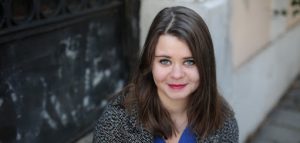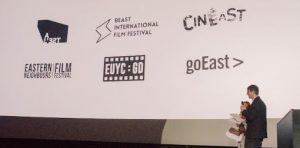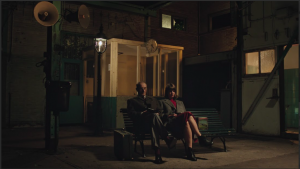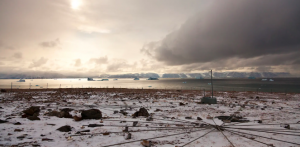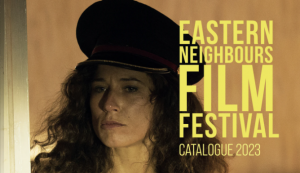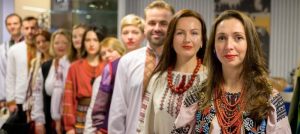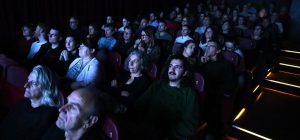Interview with Maria Takacs: Activism and Documentary Making Go Hand in Hand

Maria Takacs talks to ENFF about activism in documentary making and important lessons LGBTQI activists in Western Europe can learn from Eastern European grassroot activism. Her film Hot Men Cold Dictatorships will be screened on October 23 as part of a special ENFF and Filmhuis Den Haag cooperation within the LGBT programme, and on November 5 at ENFF in Filmhuis Den Haag. More info and tickets can be found here.
Today, how hot is your topic on the position of gay men under communist regime in Hungary?
Today the political system is getting similar to the communist dictatorships in regards to life of gays. The conservative and Christian-democratic politicians and the government are pretty homophobic. Organizing the Pride march is questionable each year, the police keeps the crowd between fences. Although, it would be easier to fence the ultra right wing anti-demonstrators. We made the film in 2015, no one talked about this topic earlier in the Hungarian cinema. For the mainstream audience the theme was new as the elderly gay men were invisible. The audience did not know anything about this parallel world. It was new, even for the young LGBT generation.
You’ve made a film on the position of lesbians, and now you explored the topic of regime oppression on gay men. How much does a treatment of sexual minorities reflect the situation of the society they are living in?
After making this two films I was reassured that the communist regime tried to keep the lesbians and gays silent. And also tried to hide them. But I aso felt that the society was even more rude putting shame on this minorities. Their bitter cups were given to them by their families, friends and colleagues.
As a filmmaker focused on LGBT topics, how do you approach film making – as an activist or as a ‘neutral’ director?
Well, I am an activist since the last 20 years and I am a filmmaker for 10 years now. LGBT themes were always in my focus. I believe that movies and videos are one of the best ways to shine more light on our community, our questions and answers. Visibility gives us power and also helps others to understand us.
Characters in your film are talking about some very personal moments and difficult topics such as the relation to those who reported gays to regime’s secret service. Please tell us more about the way you worked with them, how did you gain and nurtured their trust and openness?
I knew some of my protagonists from the activist world, like Balázs, Laci or Bencze. They also participated in my lesbian film in a short scene. They have seen Secret Years and they liked it – so their trust was given to me. The other protagonists had good connections to Milán, one of my younger protagonists. The young guys helped a lot opening the elderly gay men. During the shooting the mood was exciting and warm between them and also with the crew. They understood the importance of the film so they were happy to share their stories with us and with the audience.
We are looking forward to screening of your film in the Netherlands, a mostly LGBT friendly country. What kind of message do you expect to send to the Dutch audience?
This year I was in Scotland in an LGBT sports workshop. As far as I know, Scottish gay and lesbian movements are also pioneers in the European LGBT movements, together with the Dutch. I had a great conversation with my Scottish friend, Hugh about the differences between our countries. And Hugh had the insightful stand that Western European young LGBTQ people are born in a legally comfortable situation and favourable economical conditions for LGBTQ organizations. So they do not really know what the grassroot level is, how to start something from nothing – as it is the case in Hungarian countryside. I hope that the same could be interesting for Dutch audience. We can also share our tricks on how to fight back nationalistic homophobic politics.
Can films contribute to changing the LGBT situation in ‘transitional’ Eastern Europe?
I had a good and worthful meeting in Paris on the Communist Homosexuality Conference where I could meet Czech, Russian and Polish gay and lesbian comrades. No film like ‘Hot Men Cold Dictatorships’ exist in their country but they have excellent archives and oral history repertory. They envied the fact that we could have such great elderly gay guys (and lesbians) in front of a camera. In Czech Republic it seems there is generation gap, so the activist around 30 years old does not have much connection with the 60-ies gays and lesbians. The Russian historian gay guy knew only one elderly lesbian who dared to expose her face publicly, just because she is also an activist. And also because he knew that it is too much risk to ask these people to show their faces and their real names in Putin’s country.
You’ve briefly touched an important topics like same sex marriage and children adoption by same sex couples. Are you planning to dive deeper into these topics as well?
I have made a half an hour docfilm about same sex marriage in Hungary at the beginning of 2016. The reason for the film was that Hungarian government wanted to vanish this possibility in a silent way. So LGBT couples could have made this relationship without any meaning, only having the paper. The Hungarian LGBTQ Alliance demonstrated against it, so at the end this vanishing did not happen. I wanted to show to the lawmakers what a same sex couple looks like, what they feel, how they live, love and think about their situation. So making them visible!
What are your plans for a next project?
I am currently working with an excellent, young Lutheran priest. She has got an amazing personality and talent to collect and work with different kinds of people in the poorest district of Budapest. Her idol is Marthin Luther King, she is always fighting injustice, well-known politicians in the city council and conservative ladies on the streets. She was one of the hardly any priests in Hungary who helped migrants when they went through Budapest. The next year is the general election in Hungary I have a feeling that we will not be bored.
Interview by Tanja Matic. Photos by Tea Erdélyi.


